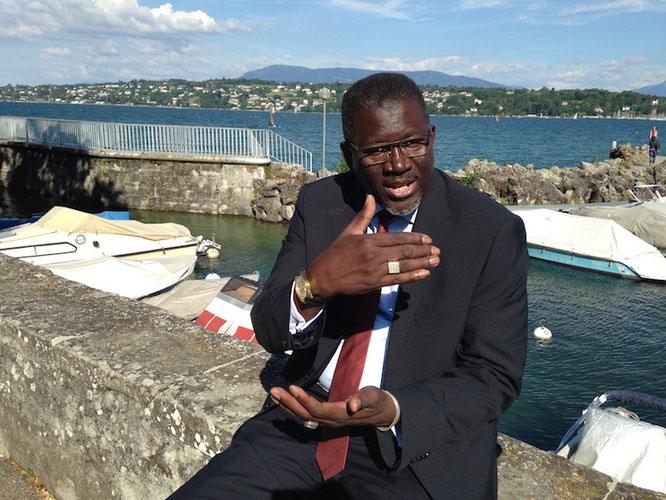Renu Chahil-Graf takes a Walk in the Park with As Sy, Secretary-General of the International Federation of the Red Cross to discuss his journey to this big
job and what drives him.
Hope and motivation drove the unstoppable As Sy to devote a lifetime of work to humanitarian issues. Born into a “normal” Senegalese family, as he describes it: two mothers, 13 brothers and
sisters, all living under one roof. Cousins, friends, neighbours expanding and contracting the household as they came and went. Undoubtedly, this built an early sense of community and
togetherness!
It was while while working for an environment and development NGO (ENDA Tiers Monde) that As confronted tough realities on the ground. Although discouraging, it inspired him to never give up. In
the most difficult circumstances, he witnessed the best in human beings. He saw how strife such as famine and health disasters, that could have divided people, brought out the best in them,
helping each other, irrespective of political or religious differences.
Now, as Secretary-General of the International Federation of Red Cross and Red Crescent Societies, the world’s oldest
humanitarian organisation with 190 member societies and 17 million volunteers, As Sy gives a vision for assisting disaster victims globally. During a disaster, but also before and after,
irrespective of nationality, race, religious beliefs, class or political opinions. As Sy remarks that battle fields are no longer defined. They move daily to different countries, different zones,
different communities. Solutions must be centred on “humanitarian principles, on the humanity that we share.” To consider human dignity, to focus on what unites us, not what divides us.
As Sy feels fortunate to have had love, stability and caring while growing up. Everyone knew each other. It was like one extended family! He credits a “wonderful mother” who gave him
opportunities which were not a given: a high school and university education. Many others in Kaolack, his birthplace, did not have the same. At that time there was just one lycée in his village
and only one university in Dakar, Senegal’s capital city.
The unfolding of the AIDS epidemic in the late nineteen-eighties, shook the very foundations of life in Africa: a new disease still being researched, with no cure or even treatment in sight. Poor
knowledge of how it spread led to mounting discrimination, stigma, abandonment, death and funerals. The only palliative was “a shoulder to lean on and words that could soothe”, says As. The
resilience of communities helped people deal with the tragedy and suffering. Families opened their hearts and homes to AIDS orphans, leading to ever-growing households. Mr Sy worked actively in
setting up the AIDS Service organisation, ICASA, which is still central to African civil society efforts. “It’s heartwarming” he says, to see the continuity.
A scholarship to study philosophy and German literature in Austria took As to Europe where he did a short stint in the UN in Vienna. But he was keen to return home and “get his hands dirty”, as
he put it. Later he was drawn into the United Nations Programme on AIDS (UNAIDS) to head their regional efforts in southern Africa and then their New York office. The world was finally waking up
to the seriousness of AIDS. He helped organise the first ever United Nations General Assembly session fully devoted to HIV and AIDS. A landmark event, with a globally adopted declaration to fight
the epidemic. Following this, As felt the need to work back in his country and resigned from the UN.
Sometime later, his passion for working in the humanitarian domain led him to accept an offer from UNICEF to head their regional office in eastern and southern Africa. His beat: Darfur, South
Sudan, famines in the horn of Africa, crises in Somalia, floods in south Angola and north Namibia. As he reflects back on those times and challenges, he expresses sadness of current crises from
Aleppo to the Rohingas.
While we continue our walk through the lush gardens of La Perle du Lac, As talks wistfully of the present global environment. He remarks that the majority of the poor may not live in the poorest
developing countries. Many live in countries that are now quite wealthy. This mix of rich and poor could be a likely cause of tension. History has shown that sometimes being a witness to
inequality can fuel violence.
In developing countries, political discourse and humanitarian and development work need to come together. Leaders in these countries need to pave the way by creating an enabling environment
for their people to help them stay and return to their countries. “Home gives you your dignity,” says As.
We discuss how people in Geneva can make a humanitarian contribution. Volunteering through the Geneva branch of the Red Cross is an excellent opportunity. Young people, including his daughter,
train refugees to navigate the administrative system, some volunteer with the Groupe SIDA. Many opportunities exist in this city.
Amid this difficult and emotionally draining work, how does As relax? Back to his first love, he says, philosophy and books, and holding the family together, raising kids, the backbone of life.
Lesser known is As Sy’s passion for his leather jacket and helmet. Look out for him on his red Harley winding his way through the Vaud countryside!










